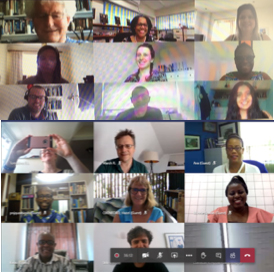Emma Tompkins
 We were looking forward to welcoming our SARTRAC team to Southampton for our first SARTRAC Annual Consortium Meeting from Monday 13thJuly – Thursday 16thJuly 2020 to discuss project progress and meet colleagues who we had not yet encountered. COVID-19 put an end to that option. Instead we used an online platform to ‘virtually’ bring together colleagues and visitors scattered across three continents (The Americas, Europe and Africa), and five countries (Jamaica, Barbados, UK, Ghana and Nairobi). Given the challenges of multiple time zones, our meetings lasted for 3 hours starting at 2pm (GMT+1) daily. Flexibility in the agenda was needed to allow for the intermittent internet connections of the 25 participants, many of whom were working from home.
We were looking forward to welcoming our SARTRAC team to Southampton for our first SARTRAC Annual Consortium Meeting from Monday 13thJuly – Thursday 16thJuly 2020 to discuss project progress and meet colleagues who we had not yet encountered. COVID-19 put an end to that option. Instead we used an online platform to ‘virtually’ bring together colleagues and visitors scattered across three continents (The Americas, Europe and Africa), and five countries (Jamaica, Barbados, UK, Ghana and Nairobi). Given the challenges of multiple time zones, our meetings lasted for 3 hours starting at 2pm (GMT+1) daily. Flexibility in the agenda was needed to allow for the intermittent internet connections of the 25 participants, many of whom were working from home.
Our first day kicked off with presentations from our external visitors Mahesh Pradhan and Joana Akrofi from UN Environment Programme in Nairobi, highlighting the upcoming high level policy processes that SARTRAC could inform – notably UN Environment Assembly in Feb 2021. This was followed by Prof Howard Roe, Sargasso Sea Commissioner, providing background on sargassum, and the ecosystem services that it provides. Updates were provided on the 2020 sargassum season from Jamaica, Barbados and Ghana, pointing to the ongoing nature of the problem, and its widespread impacts.
The meeting agenda was focussed around four main areas: i) progress on each of the four work packages, and stakeholder engagement; ii) cross-work package working; iii) forward planning for the next 12 months; iv) addressing COVID related management issues. Days 1 and 2 focussed on progress reporting, and gave the wider team an opportunity to become more familiar with progress in other work packages. WP1 (Drivers) has made significant progress and is drafting a paper to showcase some early highlights from the research showing the potential for longer term forecasting of sargassum. WP2 (Monitoring and Dissemination) is starting to collate an evidence base for improved use of satellite data in detection and monitoring of sargassum and is developing an effective working structure for the teams across Jamaica, the UK and Ghana. WP3 (Transformational Adaptation) has identified four case study locations for sargassum harvesting in Jamaica and is preparing for field collections of sargassum. WP4 (Governance) is developing a conceptual understanding of the multiple policy and legal frameworks that affect the use, re-use and management of sargassum. The stakeholder engagement team provided a plan for how stakeholder engagement will evolve over the course of the project. Key points related to the importance of making data and publications open access.
Several topics cut across all work packages, these relate to – data collection sites, monitoring data, assessing adaptation and stakeholder engagement. Some progress was made, but further work is needed to agree on consistent approaches and methods across work packages in these cross-cutting areas.
Days 3 and 4 revealed 12 month plans for each work package, up to the next Annual Consortium Meeting in July 2021. These plans covered options for budget reallocation based on underspend in the initial months of the project, due to COVID19 and included options such as: transferring resources to Ghana to allow greater levels of activity to occur, purchase of additional technical equipment to improve the capacity to gather data and transfer technology, and extending the life of the project. The discussion will continue after ACM1.
Day 4 started with group photos – virtual-style! Our meeting was full of very active discussions, exciting new research about sargassum and the start of some new friendships. We look forward to seeing you all in Jamaica next July. Until then, keep up the hard work!

